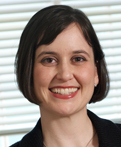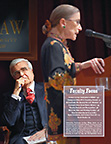Introducing Cristina Rodríguez
Assistant Professor of Law
Printer Friendly VersionA pioneer in the field of language rights, Cristina Rodríguez joins the faculty as assistant professor of law after spending the last year here as an Alexander Fellow. She is currently working on “Language Rights: Four Fundamental Questions,” a four-article progression exploring the principal theoretical questions that she believes should direct the creation of language law and policy worldwide. Rodríguez hopes to use this piece and her other work-in-progress, a comparative study of American and Canadian legal approaches to language diversity, as the heart of a future book.
Rodríguez’s academic work concerns how the law and public policy should approach a linguistically diverse society. She suggests that “one way to deal with the demands made by linguistic minorities is through the creation of ‘language rights,’ or rights to use one’s mother tongue in certain contexts and under certain circumstances,” offering examples from around the world, like the right for Anglophones and Francophones in Canada to have laws enacted in their language.
Rodríguez, who grew up in a bilingual family in largely bilingual South Texas, began her work in the area of language rights as a Reginald F. Lewis Fellow at Harvard Law School during the 2001-2002 academic year. She pursued a range of writing projects on U.S. language law and policy while auditing classes at Harvard Law School. Last spring, as an Alexander Fellow at NYU, she taught a seminar on Language and Cultural Rights.
Rodríguez earned her B.A. in history magna cum laude from Yale, then went on to Oxford University as a Rhodes Scholar. She finished at Oxford with a Master of Letters in Modern History, writing her thesis on the role of trans-Atlantic female abolitionists in the development of antislavery beliefs in the United States.
After Oxford, Rodríguez returned to Yale for her J.D., where she served as articles editor of the Yale Law Journal and lent her time to the Yale Law School Workers’ Rights Project. Rodríguez worked as a professor’s research assistant for two years, investigating the history of desegregation and civil rights law and helping to revise portions of a constitutional law casebook.
Before coming to the Law School, Rodríguez was a law clerk for the Honorable David S. Tatel of the U.S. Court of Appeals, for the District of Columbia Circuit, and the Honorable Sandra Day O’Connor of the U.S. Supreme Court.
Rodríguez says she has always had an interest “in the effects of immigration on society and culture and on the strategies different societies adopt to absorb immigrant populations—hence the interest in how to manage linguistic diversity.” Because of this long-standing interest and her personal upbringing, she says, “I have always believed in the possibility of a bilingual public sphere and a non-monolingual conception of national, political, and cultural identity, and I’ve always been attuned to the ways in which people use language to identify social and economic status, as well as to establish effective ties.” At the Law School, Rodríguez hopes to continue her work in language rights while expanding her repertoire to include issues related to religious accommodation, international human rights, and immigration law.
—

